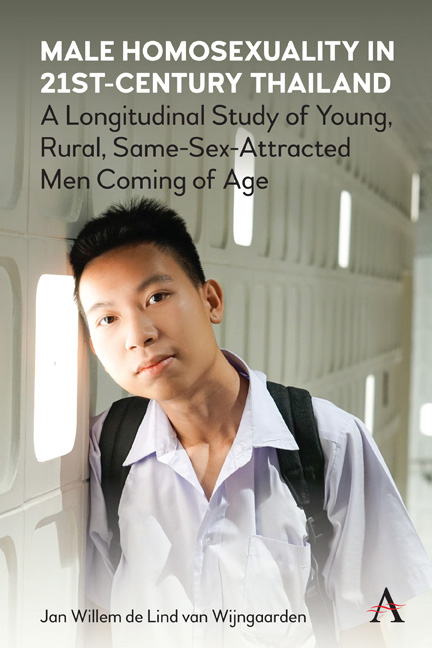 Male Homosexuality in 21st-Century Thailand
Male Homosexuality in 21st-Century Thailand Published online by Cambridge University Press: 23 March 2021
In this final chapter, the findings of this research project are summarized and discussed, including what the study has contributed to the field of sexuality research in Thailand. Implications for HIV prevention among young samesex-attracted Thai men are also discussed, including comments about some concepts and assumptions that currently underpin HIV prevention programming for gay men in Thailand. Some remarks are offered on the theoretic approach of the study, on the research design and experience, as well as on the need for further research in the future.
Summary of Key Findings
In summary, most aspects of the young men's personalities and sense of self were found to be unrelated to their gender or sexuality, but were derived from overarching aspects of Thai culture and society. Thai personhood is strongly embedded in the family and is more defined by the social and the relational, rather than by individual traits. Hierarchy, and knowing one's place in it, is of utmost importance in forms of communication and in social behaviours, with clearly defined linguistic and behavioural rules in place about what can or should (or should not) be said or done vis-à-vis people who are placed in a higher or lower position than the actor/speaker. One's place in the hierarchy is determined, above all, by age and position in the family. Apart from this, profession and class, as reflections of presumed power and influence, are important.
Maintaining harmony in social relationships, in both equal and unequal ones, is an important cultural concern. This is done by maintaining principles of kala-thetsa, a cultural concept aimed at maintaining relationships by preserving peace and calm at the surface of communications, which is characterized by saving face (naa) and mutual prestige (barami) when dealing with family and social surroundings. Being a good child towards one's parents, to whom one is morally indebted for life, and the importance of being seen as a good Thai citizen and loving one's nation are also important in this regard. In Thai culture, maintaining the prestige of the nation, the self, one's partner, parents and other important people in one's life often overrules the need to be factually truthful. This can allow for a multiplicity of truths, depending on the context and position of the speaker.
To save this book to your Kindle, first ensure no-reply@cambridge.org is added to your Approved Personal Document E-mail List under your Personal Document Settings on the Manage Your Content and Devices page of your Amazon account. Then enter the ‘name’ part of your Kindle email address below. Find out more about saving to your Kindle.
Note you can select to save to either the @free.kindle.com or @kindle.com variations. ‘@free.kindle.com’ emails are free but can only be saved to your device when it is connected to wi-fi. ‘@kindle.com’ emails can be delivered even when you are not connected to wi-fi, but note that service fees apply.
Find out more about the Kindle Personal Document Service.
To save content items to your account, please confirm that you agree to abide by our usage policies. If this is the first time you use this feature, you will be asked to authorise Cambridge Core to connect with your account. Find out more about saving content to Dropbox.
To save content items to your account, please confirm that you agree to abide by our usage policies. If this is the first time you use this feature, you will be asked to authorise Cambridge Core to connect with your account. Find out more about saving content to Google Drive.